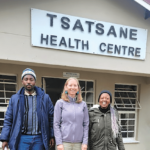Ntsoaki Motaung
“Drink PrEP, protect your loved ones,” is *Matholoana’s guiding principle as she takes Pre-exposure Prophylaxis (PrEP) to safeguard herself and her life partner from HIV.
Understanding the lifestyle she leads while away from her family, ‘Matholoana has made a proactive choice to protect both herself and her husband from potential infection.
Although her husband is unaware of her PrEP regimen, ‘Matholoana takes pride in considering not only her own well-being but also that of her partner.
“Since I am working far from home, I decided to take PrEP to protect myself from HIV. I do not just protect myself; I protect my lifetime partner, my husband. He does not know about my PrEP use, but I am proud to safeguard both of us,” she shares in an interview with Newsday.
“My reason for taking PrEP is that while I am away from home, my lifestyle puts me at risk for HIV. For me, being safe is not just an option; it is an obligation,” she adds.
PrEP is a medication designed to prevent HIV infection.
According to the Centers for Disease Control and Prevention (CDC), “PrEP is highly effective for preventing HIV when taken as prescribed, reducing the risk of getting HIV from sex by about 99 percent and from injection drug use by at least 74 percent.”
It is important to note that PrEP is less effective when not taken as prescribed.
Since PrEP only protects against HIV, using condoms remains essential for protection against other sexually transmitted infections (STIs). Condom use is also crucial to help prevent HIV transmission if PrEP is not adhered to.
A study conducted on September 27, 2023, titled “Stakeholder Perspectives on Interventions to Improve HIV Pre-exposure Prophylaxis Uptake and Continuation in Lesotho,” revealed significant barriers to PrEP initiation.
For men, fear of HIV testing was identified as the most considerable obstacle to starting PrEP, while for women, a lack of awareness was highlighted as a more pressing concern.
Social-related barriers also vary by gender; men prioritise concerns about discussing sexual matters with healthcare providers and perceived stigma more than women. In contrast, women face other social barriers, such as limited social support and decision-making power.
According to the LePHIA 2020 survey, among HIV-negative adults aged 15 years and older, 65.4 percent reported they would consider taking PrEP to prevent HIV.
PrEP is implemented in countries following guidelines set by the World Health Organisation (WHO), including the Consolidated HIV Guidelines for Prevention, Treatment, Service Delivery, and Monitoring (July 2021), the Differentiated and Simplified Pre-exposure Prophylaxis for HIV Prevention technical brief (July 2022), and The Consolidated Guidelines on HIV, Viral Hepatitis, and STI Prevention, Diagnosis, Treatment, and Care for Key Populations (July 2022).
Lesotho’s national policies also support PrEP use, including the National Guidelines on the Use of Antiretroviral Therapy for HIV Prevention and Treatment (fifth edition, 2016) and the National HIV & AIDS Strategic Plan 2018/19-2022/23.
*Matholoana’s real name is not used to protect her identity.
Summary
- According to the Centers for Disease Control and Prevention (CDC), “PrEP is highly effective for preventing HIV when taken as prescribed, reducing the risk of getting HIV from sex by about 99 percent and from injection drug use by at least 74 percent.
- A study conducted on September 27, 2023, titled “Stakeholder Perspectives on Interventions to Improve HIV Pre-exposure Prophylaxis Uptake and Continuation in Lesotho,” revealed significant barriers to PrEP initiation.
- PrEP is implemented in countries following guidelines set by the World Health Organisation (WHO), including the Consolidated HIV Guidelines for Prevention, Treatment, Service Delivery, and Monitoring (July 2021), the Differentiated and Simplified Pre-exposure Prophylaxis for HIV Prevention technical brief (July 2022), and The Consolidated Guidelines on HIV, Viral Hepatitis, and STI Prevention, Diagnosis, Treatment, and Care for Key Populations (July 2022).

Your Trusted Source for News and Insights in Lesotho!
At Newsday Media, we are passionate about delivering accurate, timely, and engaging news and multimedia content to our diverse audience. Founded with the vision of revolutionizing the media landscape in Lesotho, we have grown into a leading hybrid media company that blends traditional journalism with innovative digital platforms.










